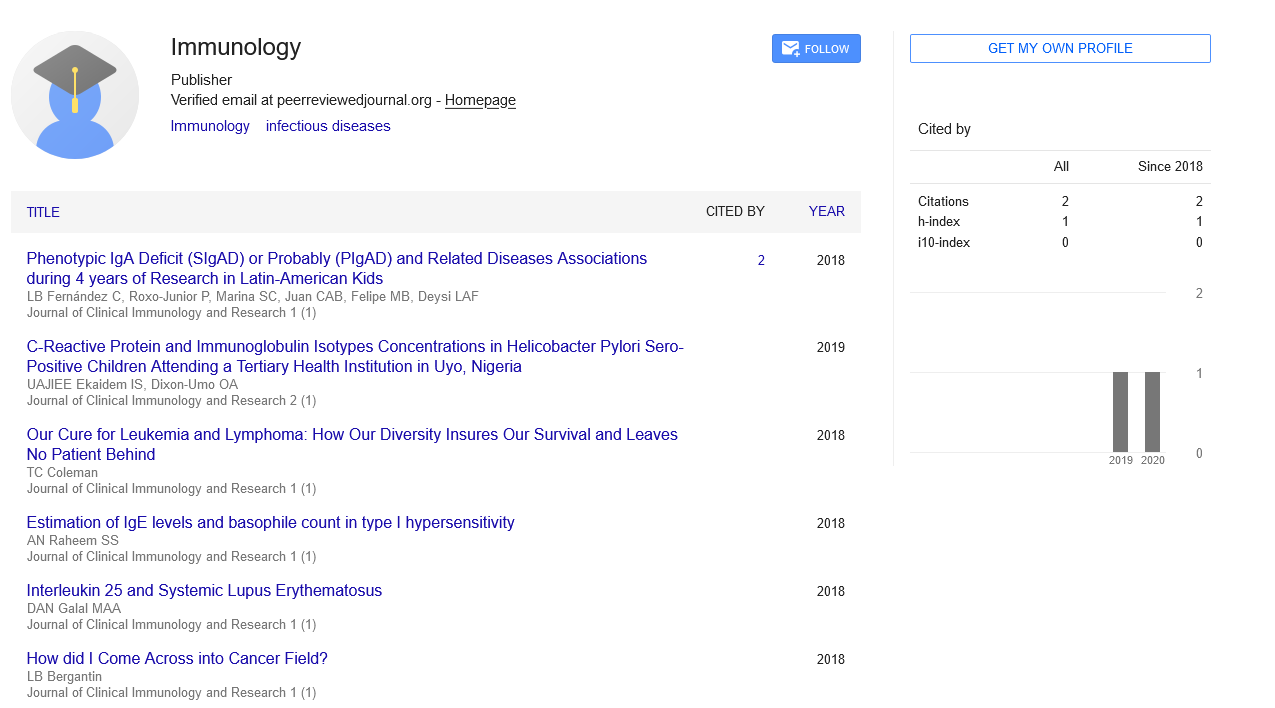Editorial, J Clin Immunol Res Vol: 4 Issue: 5
Dispersion and Explanation of Vaccine Immunology in Human Body
Franco Locatelli*,
Dipartimento di Scienze Pediatriche, Università di Pavia, IRCCS Policlinico San Matteo, Pavia, Italy
Corresponding Author:
Franco Locatelli
Dipartimento di Scienze Pediatriche, Università di Pavia, IRCCS Policlinico San Matteo, Pavia, Italy
E-mail: locatelli@matteo.it
Keywords: Invulnerable reaction, Immunization, Antibodies
Introduction
An immunization is an organic item that can be utilized to securely incite an invulnerable reaction that gives insurance against contamination as well as infection on resulting openness to a microorganism. To accomplish this, the immunization should contain antigens that are either gotten from the microbe or delivered artificially to address parts of the microorganism. The fundamental part of most immunizations is at least one protein antigens that instigate safe reactions that give insurance. Nonetheless, polysaccharide antigens can likewise prompt defensive invulnerable reactions and are the premise of immunizations that have been created to forestall a few bacterial contaminations, for example, pneumonia and meningitis brought about by Streptococcus pneumoniae, since the last part of the 1980s. Assurance gave by an antibody is estimated in clinical preliminaries that relate resistant reactions to the immunization antigen to clinical end focuses (like avoidance of contamination, a decrease in illness seriousness or a diminished pace of hospitalization). Observing an insusceptible reaction that associates with assurance can speed up the advancement of and admittance to new antibodies. Immunizations are by and large named live or non-live (once in a while approximately alluded to as 'inactivated') to recognize those antibodies that contain constricted reproducing strains of the pertinent pathogenic organic entity from those that contain just parts of a microbe or killed entire organic entities. Notwithstanding the 'customary' live and non-live immunizations, a few different stages have been created throughout recent many years, including viral vectors, nucleic corrosive based RNA and DNA antibodies, and infection like particles (talked about in more detail later). Vaccination is a foundation of general wellbeing strategy and is certifiably exceptionally practical when used to safeguard kid wellbeing. Despite the fact that it very well may be contended that immunology has not hitherto contributed a lot to antibody improvement, in that a large portion of the immunizations we use today were created and tried exactly, obviously there are significant difficulties ahead to foster new immunizations for challenging to-target microbes, for which we desperately need a superior comprehension of defensive insusceptibility. Besides, acknowledgment of the tremendous potential and difficulties for antibodies to control sickness episodes and safeguard the more established populace, along with the accessibility of a variety of new innovations, make it the ideal time for immunologists to be associated with planning the up and coming age of strong immunogens. This Review gives a basic outline of antibodies, vaccination and related issues and accordingly plans to illuminate a wide logical crowd about the basic immunological ideas. Antibodies have changed general wellbeing, especially since public projects for inoculation previously turned out to be appropriately settled and composed during the 1960s. In nations with high immunization program inclusion, a large number of the illnesses that were beforehand liable for most of youth passings have basically vanished. The World Health Organization (WHO) appraises that 2 million - 3 million lives are saved every year by current inoculation programs, adding to the obvious decrease in mortality of kids under 5 years old enough internationally from 93 deaths per 1,000 live births in 1990 to 39 deaths per 1,000 live births in 2018. Antibodies exploit the uncommon capacity of the profoundly advanced human insusceptible framework to react to, and recollect, experiences with microbe antigens. Notwithstanding, for a lot of history, immunizations have been created through observational examination without the association of immunologists. There is an incredible need today for worked on comprehension of the immunological reason for immunization to foster antibodies for difficult to-target microbes (like Mycobacterium tuberculosis, the bacterium that causes tuberculosis and antigenically factor microorganisms (like HIV), to control episodes that compromise worldwide wellbeing security, (for example, COVID-19 or Ebola) and to work out how to resuscitate invulnerable reactions in the maturing insusceptible system7 to safeguard the becoming populace of older grown-ups from irresistible illnesses.
 Spanish
Spanish  Chinese
Chinese  Russian
Russian  German
German  French
French  Japanese
Japanese  Portuguese
Portuguese  Hindi
Hindi 